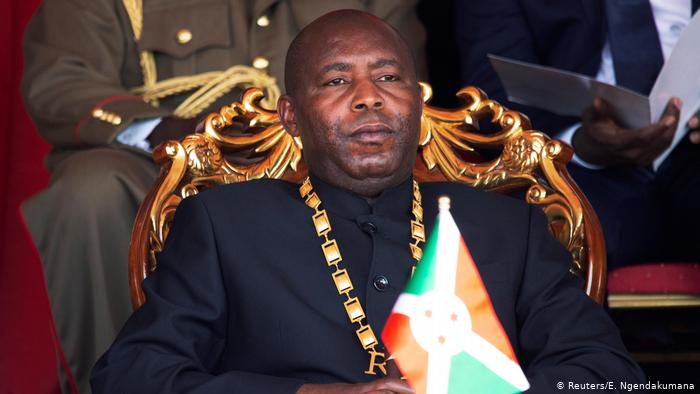
President Ndayishimiye’s purge of top officials shows the fragility of recent economic and political policy changes.
At the beginning of September, an audio recording emerged in Burundi allegedly featuring President Évariste Ndayishimiye accusing unnamed political figures of plotting against him. Soon after, he sacked prime minister Alain-Guillaume Bunyoni in the country’s first major political reshuffle since the president came to power in 2020.
There were also rumours of a possible coup and tensions in the country’s ruling party, the National Council for the Defense of Democracy – Forces for the Defense of Democracy (CNDD-FDD).
These political ructions were apparently instigated by disagreements in the ruling party over foreign and domestic policy reforms implemented by Ndayishimiye over the past two years. They aim to restore Burundi’s international reputation and bring domestic stability, which deteriorated in 2015 when the late former president Pierre Nkurunziza declared his intention to run for a third term.
The political crisis triggered by Nkurunziza’s announcement and the subsequent sanctions issued by the United States (US) and European Union (EU) wreaked havoc on Burundi’s economy. It also worsened longstanding domestic political and socio-economic problems.
The president has promised to crack down on party elites’ monopolies over various economic sectors.
Ndayishimiye’s policy reforms have put Burundi on a new political and economic path, and facilitated the country’s return to the international fold. But some changes have adversely affected the party elites’ interests, widening the rifts between the president and his rivals in the CNDD-FDD.
Burundi has made great strides on the foreign policy front, including re-engaging its neighbours and signing infrastructure agreements in the East African Community. ‘Democratic reforms’ adopted to facilitate the removal of sanctions include loosening media restrictions, reinstating the British Broadcasting Corporation’s operating licence and releasing human rights activists. The EU and US welcomed the policy shifts and rewarded the president’s efforts by easing restrictions and restoring aid to Burundi.
Back home, the government is trying to tackle political and socio-economic challenges. The president has promised to crack down on monopolies held by party elites over various economic sectors. So it was unsurprising that the trade minister announced in September that the country would ease imports of basic commodities including cement, sugar, maize and maize flour. The central bank lifted restrictions on foreign currency exchange, allowing forex bureaus to operate after a two-year ban.
The foreign currency shortage encouraged a black-market currency trade and contributed to the devaluation of the Burundian franc Earlier this year, the government stepped in to import fuel because private suppliers were struggling to secure foreign currency to do so. Fuel shortages exacerbated the scarcity of essential commodities and increased inflation.
Indications are that September’s purge targeted figures allied to former president Nkurunziza
Although these measures have eased shortages of basic goods, the reforms lack political consensus, and questions about their credibility remain. Human rights activists have publicly petitioned against lifting US and EU sanctions, arguing that the government has yet to make any meaningful change. Several local and international human rights organisations remain banned in Burundi, and activists and opposition party members still face harassment from the security forces and CNDD-FDD-aligned youth militia, the Imbonerakure.
The appointment of Gervais Ndirakobuca as Bunyoni’s replacement lends credence to human rights activists’ allegations. Ndirakobuca is still under EU sanctions for his role in the violent crackdown against civilians during the 2015 crisis.
Perhaps Burundi’s diplomatic victories have given the president room to post his political allies to top government positions. The continued prominence of CNDD-FDD hardliners like Ndirakobuca in senior government positions casts doubt on the credibility of the reforms.
Ndayishimiye’s policy shifts have also exacerbated tensions within the CNDD-FDD. These conflicts are made worse by indications that September’s political purge seems to have targeted figures allied to former president Nkurunziza. Aside from Bunyoni, those sacked included chief of staff Gabriel Nizigama, five ministers and 54 provincial police commissioners.
Unsurprisingly, some political elites have resisted the changes to import policies, which have adversely impacted their businesses. Allegations are rife that Bunyoni and other influential party members attempted to sabotage the easing of import restrictions, having benefited from the shortage of essential goods by inflating prices on the black market.
Some political elites are resisting import policy changes, which adversely impact their businesses
If the rumours of a coup plot are to be believed, that might signal that aggrieved party members could resort to violence to stop the reforms. Other threats to the country’s political stability are ongoing human rights violations and the Imbonerakure’s activities. What is clear is that Ndayishimiye’s reforms have revealed cracks in Burundi’s political landscape.
In the coming months, the government needs to ensure that policy changes are seen as credible, especially in the eyes of citizens. Bans on human rights organisations should be suspended and jailed activists released. The Imbonerakure’s violent activities against the population must also be stopped.
The president will have to tread carefully to manage tensions within the CNDD-FDD, which might mean accommodating some of his rivals’ economic interests. After the September political reshuffle, Ndayishimiye should feel more confident to forge ahead with reforms despite dissent from within his party.
Subscribe to view notification of our daily news
RwandaPodium © All Rights Reserved. Powered by thesublime.rw